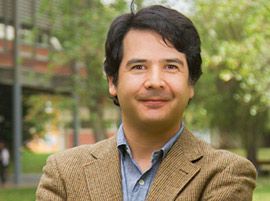
Carlos Cornejo Alarcón
– Doctor en Filosofía, Universidad de Colonia, Alemania.
– Psicólogo, P. Universidad Católica de Chile.
– Licenciado en Psicología, P. Universidad Católica de Chile.
Mi área de investigación principal es la comprensión humana, esto es, los fenómenos neurofisiológicos, fenomenológicos y conductuales implicados en la construcción y mantención de sentido. Mi foco principal ha sido la comprensión del lenguaje figurado, donde he estudiado -experimental y etnográficamente- la influencia de variables contextuales sobre la comprensión de estímulos estrictamente lingüísticos.
Actualmente trabajo en las consecuencias de esta visión holista del lenguaje a la situación de enseñanza/aprendizaje.
Cursos impartidos
- 1994 – Segundo Semestre Pregrado, Psicologia Social, Lectivo, SOL112/1
- 1995 – Primer Semestre Pregrado, Teoria Cognitiva I, Catedra, PSL403/1
- 1995 – Primer Semestre Pregrado, Psicologia Social, Catedra, PSB141B/1
- 2000 – Segundo Semestre Pregrado, Teoria Cognitiva II, Catedra, PSL408/1
- 2000 – Segundo Semestre Pregrado, Teoria Cognitiva II, Catedra, PSL408/2
- 2000 – Segundo Semestre Pregrado, Historia de la Psicologia Contemporanea, Catedra, PSB403/2
- 2000 – Segundo Semestre Post-Grado, Paradigmas de la Psicologia Cientifica, Catedra, PSD500/1
- 2001 – Primer Semestre Post-Grado, Paradigmas de la Psicologia Cientifica, Catedra, PSD500/1
- 2001 – Primer Semestre Pregrado, Teoria Cognitiva I, Catedra, PSL403/2
- 2001 – Primer Semestre Post-Grado, Coloquio:Topicos Actuales en Psicologia I, Catedra, PSD501/1
- 2001 – Primer Semestre Post-Grado, Psicologia Cognitiva, Catedra, PSD505/1
- 2001 – Segundo Semestre Pregrado, Historia de la Psicologia Contemporanea, Catedra, PSB403/2
- 2001 – Segundo Semestre Pregrado, Teoria Cognitiva II, Catedra, PSL408/1
- 2001 – Segundo Semestre Pregrado, Teoria Cognitiva II, Catedra, PSL408/2
- 2001 – Segundo Semestre Post-Grado, Tesis II, Tesis, Proyecto, Seminario, PSM407/1
- 2001 – Segundo Semestre Post-Titulo, Psicologia del Lenguaje, Catedra, PSD524/1
- 2002 – Primer Semestre Pregrado, Teorias y Sistemas Psicologicos, Catedra, PSB400A/1
- 2002 – Primer Semestre Post-Grado, Seminario de Profundizacion Metodologico II, Tesis, Proyecto, Seminario, PSD568/1
- 2002 – Primer Semestre Post-Grado, Seminario de Investigacion Doctoral II, Tesis, Proyecto, Seminario, PSD566/1
- 2002 – Primer Semestre Post-Grado, Seminario de Investigacion Doctoral I, Tesis, Proyecto, Seminario, PSD565/1
- 2002 – Primer Semestre Post-Grado, Practica en Investigacion II, Practica, PSD541/1
- 2002 – Primer Semestre Post-Grado, Practica en Investigacion I, Practica, PSD540/1
- 2002 – Primer Semestre Pregrado, Teoria Cognitiva I, Catedra, PSL403/2
- 2002 – Primer Semestre Post-Grado, Paradigmas de la Psicologia Cientifica, Catedra, PSD500/1
- 2002 – Primer Semestre Post-Grado, Psicologia Cognitiva, Catedra, PSD505/1
- 2002 – Segundo Semestre Pregrado, Teoria Cognitiva II, Catedra, PSL408/2
- 2002 – Segundo Semestre Pregrado, Teoria Cognitiva II, Catedra, PSL408/1
- 2002 – Segundo Semestre Post-Grado, Tesis Doctoral I, Tesis, Proyecto, Seminario, PSD561/1
- 2002 – Segundo Semestre Post-Grado, Proyecto de Tesis Doctoral, Tesis, Proyecto, Seminario, PSD560/1
- 2002 – Segundo Semestre Post-Grado, Practica en Investigacion I, Practica, PSD540/1
- 2002 – Segundo Semestre Post-Grado, Seminario de Investigacion Doctoral I, Tesis, Proyecto, Seminario, PSD565/1
- 2003 – Primer Semestre Post-Grado, Paradigmas de la Psicologia Cientifica, Catedra, PSD500/1
- 2003 – Primer Semestre Pregrado, Teoria Cognitiva I, Catedra, PSL403/2
- 2003 – Primer Semestre Pregrado, Teoria Cognitiva I, Catedra, PSL403/1
- 2003 – Primer Semestre Post-Grado, Psicologia Cognitiva, Catedra, PSD505/1
- 2003 – Primer Semestre Post-Grado, Seminario de Profundizacion Metodologico II, Tesis, Proyecto, Seminario, PSD568/1
- 2003 – Primer Semestre Post-Grado, Seminario de Profundizacion Metodologico I, Tesis, Proyecto, Seminario, PSD567/1
- 2003 – Primer Semestre Post-Grado, Seminario de Investigacion Doctoral II, Tesis, Proyecto, Seminario, PSD566/1
- 2003 – Primer Semestre Post-Grado, Tesis Doctoral II, Tesis, Proyecto, Seminario, PSD562/1
- 2003 – Primer Semestre Post-Grado, Tesis Doctoral I, Tesis, Proyecto, Seminario, PSD561/1
- 2003 – Primer Semestre Post-Grado, Practica en Investigacion I, Practica, PSD540/1
- 2003 – Segundo Semestre Post-Grado, Practica en Investigacion II, Practica, PSD541/1
- 2003 – Segundo Semestre Post-Grado, Practica en Investigacion I, Practica, PSD540/1
- 2003 – Segundo Semestre Pregrado, Teoria Cognitiva II, Catedra, PSL408/2
- 2003 – Segundo Semestre Pregrado, Teoria Cognitiva II, Catedra, PSL408/1
- 2003 – Segundo Semestre Pregrado, Teorias y Procesos Psicologicos, Catedra, PSB400B/1
- 2003 – Segundo Semestre Post-Grado, Proyecto de Tesis Doctoral, Tesis, Proyecto, Seminario, PSD560/1
- 2003 – Segundo Semestre Post-Grado, Seminario de Investigacion Doctoral II, Tesis, Proyecto, Seminario, PSD566/1
- 2004 – Primer Semestre Post-Grado, Practica en Docencia I, Practica, PSD550/1
- 2004 – Primer Semestre Post-Grado, Practica en Investigacion I, Practica, PSD540/1
- 2004 – Primer Semestre Post-Grado, Psicologia Cognitiva, Catedra, PSD505/1
- 2004 – Primer Semestre Post-Grado, Paradigmas de la Psicologia Cientifica, Catedra, PSD500/1
- 2004 – Primer Semestre Pregrado, Teorias y Procesos Psicologicos, Catedra, PSB400B/1
- 2004 – Primer Semestre Post-Grado, Seminario de Profundizacion Metodologico I, Tesis, Proyecto, Seminario, PSD567/1
- 2004 – Primer Semestre Post-Grado, Tesis I, Tesis, Proyecto, Seminario, PSM406/1
- 2004 – Segundo Semestre Pregrado, Teorias y Procesos Psicologicos, Catedra, PSB400B/1
- 2004 – Segundo Semestre Pregrado, Teorias y Procesos Psicologicos, Catedra, PSB400B/2
- 2004 – Segundo Semestre Pregrado, Teoria Cognitiva II, Catedra, PSL408/1
- 2004 – Segundo Semestre Pregrado, Teoria Cognitiva II, Catedra, PSL408/2
- 2004 – Segundo Semestre Post-Grado, Seminario de Profundizacion Metodologico I, Tesis, Proyecto, Seminario, PSD567/1
- 2004 – Segundo Semestre Post-Grado, Seminario de Profundizacion Metodologico II, Tesis, Proyecto, Seminario, PSD568/1
- 2004 – Segundo Semestre Post-Grado, Proyecto de Tesis Doctoral, Tesis, Proyecto, Seminario, PSD560/1
- 2004 – Segundo Semestre Post-Grado, Practica en Investigacion II, Practica, PSD541/1
- 2004 – Segundo Semestre Pregrado, Epistemologia, Lectivo, PSO255/1
- 2004 – Segundo Semestre Pregrado, Teoria Cognitiva II, Catedra, PSL408/3
- 2004 – Segundo Semestre Post-Grado, Tesis Doctoral II, Tesis, Proyecto, Seminario, PSD562/1
- 2005 – Primer Semestre Post-Grado, Paradigmas de la Psicologia Cientifica, Catedra, PSD500/1
- 2005 – Primer Semestre Post-Grado, Psicologia Cognitiva, Catedra, PSD505/1
- 2005 – Primer Semestre Post-Grado, Practica en Investigacion I, Practica, PSD540/1
- 2005 – Primer Semestre Post-Grado, Tesis Doctoral III, Tesis, Proyecto, Seminario, PSD563/1
- 2005 – Primer Semestre Post-Grado, Seminario de Profundizacion Metodologico I, Tesis, Proyecto, Seminario, PSD567/1
- 2005 – Primer Semestre Post-Grado, Tesis I, Tesis, Proyecto, Seminario, PSM406/1
- 2005 – Segundo Semestre Pregrado, Teorias y Procesos Psicologicos, Catedra, PSB400B/2
- 2005 – Segundo Semestre Pregrado, Teorias y Procesos Psicologicos, Catedra, PSB400B/1
- 2005 – Segundo Semestre Pregrado, Teoria Cognitiva II, Catedra, PSL408/1
- 2005 – Segundo Semestre Pregrado, Teoria Cognitiva II, Catedra, PSL408/2
- 2005 – Segundo Semestre Pregrado, Teoria Cognitiva II, Catedra, PSL408/3
- 2005 – Segundo Semestre Pregrado, Epistemologia, Lectivo, PSO255/1
- 2005 – Segundo Semestre Post-Grado, Practica en Investigacion II, Practica, PSD541/1
- 2005 – Segundo Semestre Post-Grado, Tesis II, Tesis, Proyecto, Seminario, PSM407/1
- 2005 – Segundo Semestre Post-Grado, Tesis Doctoral IV, Tesis, Proyecto, Seminario, PSD564/1
- 2005 – Segundo Semestre Post-Grado, Seminario de Investigacion Doctoral II, Tesis, Proyecto, Seminario, PSD566/1
- 2005 – Segundo Semestre Post-Grado, Seminario de Profundizacion Metodologico II, Tesis, Proyecto, Seminario, PSD568/1
- 2006 – Primer Semestre Post-Grado, Practica en Investigacion I, Practica, PSD540/1
- 2006 – Primer Semestre Post-Grado, Tesis I, Tesis, Proyecto, Seminario, PSM406/1
- 2006 – Segundo Semestre Pregrado, Teorias y Procesos Psicologicos, Catedra, PSB400B/1
- 2006 – Segundo Semestre Post-Grado, Tesis II, Tesis, Proyecto, Seminario, PSM407/1
- 2006 – Segundo Semestre Post-Grado, Tesis I, Tesis, Proyecto, Seminario, PSM406/1
- 2006 – Segundo Semestre Post-Grado, Proyecto de Tesis Doctoral, Tesis, Proyecto, Seminario, PSD560/1
- 2006 – Segundo Semestre Pregrado, Epistemologia, Lectivo, PSO255/1
- 2006 – Segundo Semestre Pregrado, Teorias y Procesos Psicologicos, Catedra, PSB400B/2
- 2006 – Segundo Semestre Pregrado, Teoria Cognitiva II, Catedra, PSL408/1
- 2006 – Segundo Semestre Pregrado, Teoria Cognitiva II, Catedra, PSL408/2
- 2006 – Segundo Semestre Pregrado, Teoria Cognitiva II, Catedra, PSL408/3
- 2007 – Primer Semestre Post-Grado, Tesis II, Tesis, Proyecto, Seminario, PSM407/1
- 2007 – Primer Semestre Post-Grado, Tesis I, Tesis, Proyecto, Seminario, PSM406/1
- 2007 – Primer Semestre Post-Grado, Desarrolos en Psicologia Cognitiva, Catedra, PSI4007/1
- 2007 – Primer Semestre Post-Grado, Microgenesis, Catedra, PSI3028/1
- 2007 – Primer Semestre Post-Titulo, Percepcion y Representacion del Paisaje, Catedra, AQP3350/1
- 2007 – Segundo Semestre Pregrado, Teoria Cognitiva II, Catedra, PSL408/1
- 2007 – Segundo Semestre Pregrado, Teorias y Procesos Psicologicos, Catedra, PSB400B/1
- 2007 – Segundo Semestre Pregrado, Teoria Cognitiva II, Catedra, PSL408/2
- 2007 – Segundo Semestre Post-Grado, Tesis II, Tesis, Proyecto, Seminario, PSM407/1
- 2007 – Segundo Semestre Post-Grado, Metodos Cualitativos para la Investigacion de Procesos y Resultados Terapeuticos, Catedra, PSM5002/1
- 2007 – Segundo Semestre Pregrado, Teoria Cognitiva II, Catedra, PSL408/3
- 2008 – Primer Semestre Post-Grado, Desarrollo en Paradigmas de la Psicologia, Catedra, PSI4012/1
- 2008 – Primer Semestre Post-Grado, Analisis Critico de Paradigmas en Psicoterapia, Catedra, PSM417/1
- 2008 – Primer Semestre Post-Grado, Estudio Dirigido, Catedra, PSM432/3
- 2008 – Primer Semestre Post-Grado, Tesis II, Tesis, Proyecto, Seminario, PSM407/1
- 2008 – Segundo Semestre Pregrado, Teoria Cognitiva II, Catedra, PSL408/1
- 2008 – Segundo Semestre Pregrado, Teoria Cognitiva II, Catedra, PSL408/2
- 2009 – Primer Semestre Post-Grado, Desarrollo en Paradigmas de la Psicologia, Catedra, PSI4012/1
- 2009 – Primer Semestre Post-Grado, Analisis Critico de Paradigmas en Psicoterapia, Catedra, PSM417/1
- 2009 – Primer Semestre Post-Grado, Seminario de Teorias y Fundamentos de la Educacion I, Tesis, Proyecto, Seminario, EDU4200/1
- 2009 – Segundo Semestre Pregrado, Historia de la Psicología, Catedra, PSI1103/2
- 2009 – Segundo Semestre Pregrado, Teoria Cognitiva II, Catedra, PSL408/1
- 2009 – Segundo Semestre Pregrado, Teoria Cognitiva II, Catedra, PSL408/2
- 2010 – Primer Semestre Post-Grado, Desarrollo en Paradigmas de la Psicologia, Catedra, PSI4012/1
- 2010 – Primer Semestre Post-Grado, Analisis Critico de Paradigmas en Psicoterapia, Catedra, PSM417/1
- 2010 – Primer Semestre Post-Grado, Seminario de Teorias y Fundamentos de la Educacion I, Tesis, Proyecto, Seminario, EDU4200/1
- 2010 – Segundo Semestre Pregrado, Historia de la Psicología, Catedra, PSI1103/2
- 2010 – Segundo Semestre Pregrado, Teoria Cognitiva II, Catedra, PSL408/1
- 2010 – Segundo Semestre Pregrado, Teoria Cognitiva II, Catedra, PSL408/2
- 2010 – Segundo Semestre Post-Grado, Seminario de Investigacion Doctoral I, Tesis, Proyecto, Seminario, PSD565/1
- 2011 – Primer Semestre Post-Grado, Desarrollo en Paradigmas de la Psicologia, Catedra, PSI4012/1
- 2011 – Primer Semestre Post-Grado, Seminario de Teorias y Fundamentos de la Educacion I, Tesis, Proyecto, Seminario, EDU4200/1
- 2011 – Primer Semestre Post-Grado, Tesis I, Tesis, Proyecto, Seminario, EDU4207/1
- 2011 – Segundo Semestre Pregrado, Historia de la Psicología, Catedra, PSI1103/2
- 2011 – Segundo Semestre Post-Grado, Tesis II, Tesis, Proyecto, Seminario, EDU4208/1
- 2011 – Segundo Semestre Pregrado, Inteligencia, Pensamiento y Lenguaje, Catedra, PSI2308/2
- 2011 – Segundo Semestre Pregrado, Inteligencia, Pensamiento y Lenguaje, Catedra, PSI2308/1
- 2012 – Primer Semestre Post-Grado, Desarrollo en Paradigmas de la Psicologia, Catedra, PSI4012/1
- 24/04/2007 – 25/04/2007 Seminario Internacional: Diálogo Como Paradigma Para Las Ciencias Humanas, Escuela De Psicología De La Pontificia Universidad Católica De Chile, Chile.
- 19/11/2008 – 21/11/2008 Presidente Comisión Evaluadora Para Acreditación De La Carrera De Psicología De La Universidad Central, A Solicitud De La Agencia De Acreditación Qualitas., Universidad Central, Chile, Presidente Comisión Evaluadora Para Acreditación De Carrera De Psicología.
- 10/07/2009 – 11/07/2009 Presidente Comisión Evaluadora Para Acreditación De Magister En Psicología De La Universidad De Concepción, A Solicitud De La Comisión Nacional De Acreditación (Cna), Universidad De Concepción, Chile, Presidente Comisión Evaluadora Para Acreditación De Magister En Psicología.
- 05/10/2009 – 07/10/2009 Presidente Comisión Evaluadora Para Acreditación De La Carrera De Psicología De La Universidad La Frontera (Temuco), A Solicitud De La Agencia De Acreditación Qualitas, Universidad La Frontera (Temuco), Chile, Presidente Comisión Evaluadora Para Acreditación De Carrera De Psicología.
Participación en Eventos Científicos y Humanistas
- 20/07/2006 – 23/07/2006 Language Culture And Mind Conference Lcm2, Francia, Paris, Why Semantics And Pragmatics Do Not Fit In The Same Equation, Sí Afiliación UC (*)
- 20/07/2006 – 23/07/2006 Language Culture And Mind Conference Lcm2, Francia, Paris, Intersubjectivity As Cophenomenology, Sí Afiliación UC (*)
- 15/07/2008 – 18/07/2008 Language Culture And Mind Conference Lcm3, Dinamarca, Odensee, Language Dynamics As Adaptive, Flexible Behavior: The Emergence Of Meaning And Social Life, Sí Afiliación UC (*)
- 15/07/2008 – 18/07/2008 Language Culture And Mind Conference Lcm3, Dinamarca, Odensee, Being-There-With-Others: Phenomenological Aspects Of Human Interaction, Sí Afiliación UC (*)
- 15/07/2008 – 18/07/2008 Language Culture And Mind Conference Lcm3, Dinamarca, Odensee, Microgenetical Studies On The Organismic Precomprehension Of Faces, Sí Afiliación UC (*)
- 02/09/2010 – 03/09/2010 Earli Conference For The Special Groups Sig10 And Sig21: Moving Through Cultures Of Learning, Paises Bajos, Utrecht, From Conceptual Change To Meaning Construction: A Pragma-Semiotical Approach To Learning,
- Sí Afiliación UC (*)
- 27/04/2011 – 29/11/2011 2o Coloquio Lenguaje Y Cognición, Chile, Concepción, La Importancia Teórica De La Medición De Los Movimientos Corporales En La Interacción Comunicativa, Sí Afiliación UC (*)
- 20/07/2011 – 23/07/2011 33rd Annual Cognitive Science Conference Cogsci, Estados Unidos, Boston, Spontaneous Corporal Coordination In Empathic And Non-Empathic Interactions, Sí Afiliación UC (*)
- 05/09/2011 – 10/09/2011 Iscar 2011 Conference (International Society For Cultural And Activity Research), Italia, Roma, Living And Observing: Two Ways Of Understanding Time, Sí Afiliación UC (*)
- 09/11/2011 – 11/11/2012 19 Congreso Internacional De La Sociedad Chilena De Lingüística, Chile, Valparaíso, Convergencia Fonética Y Empatía: Un Estudio Experimental, Sí Afiliación UC (*)
- “Patrones coordinativos corporales en situaciones interaccionales de confianza y desconfianza”, FONDECYT Regular, 4 años (marzo 2014 – marzo 2018), Año de adjudicación: 2014 (investigador responsable)
- “Mejoramiento del Equipo de Captura de Movimiento de la Escuela de Psicología de la PUC”, CONICYT / FONDEQUIP /, 14 meses (Octubre 2012-Diciembre 2013), Año de adjudicación: 2012, (investigador responsable)
- “Estudio sobre el impacto cognitivo de la capacitación en la identificación de aromas” UC/VRI, 2 años (Octubre 2011 – Octubre 2013), Año de adjudicación: 2011 (investigador responsable)
- “Los Procesos de Coordinación Corporal y su Rol en la Comunicación Humana”, FONDECYT Regular, 4 años (marzo 2010 – marzo 2014), Año de adjudicación: 2010, (investigador responsable)
- “Fortalecimiento de las áreas clínica y organizacional de la Escuela de Psicología de la Pontificia Universidad Católica de Chile”, CONICYT / Capital Humano Avanzado / Inserción de Investigadores en la Academia, 3 años (Octubre 2010 – Octubre 2013), Año de adjudicación: 2010 (investigador responsable)
- “Estudio neurofisiológico del procesamiento de información emocional relevante para el desarrollo de competencias sociales en el síndrome de déficit atencional e hiperactividad”, FONDECYT Regular, 3 años (marzo 2009 – marzo 2012), Año de adjudicación: 2009, (co-investigador).
Publicaciones indexada ISI:
- Cuadros, Z., Hurtado, E., & Cornejo, C. (2020). Infant-adult synchrony in spontaneous and nonspontaneous interactions. Plos one, 15(12), e0244138.
- Cuadros, Z., Hurtado, E., & Cornejo, C. (2019). Measuring dynamics of infant-adult synchrony through mocap. Frontiers in psychology, 10, 2839.
- Aldunate, N., López, V., Cornejo, C., Moënne-Loccoz, C., & Carr, D. (2019). Analytical and holistic approaches influence the semantic integration: Evidence from the N400 effect.
- Schriever, V. A., Agosin, E., Altundag, A., Avni, H., Van, H. C., Cornejo, C., … & Hummel, T. (2018). Development of an international odor identification test for children: the universal sniff test. The Journal of pediatrics, 198, 265-272.
- Fossa, P., Awad, N., Ramos, F., Molina, Y., de La Puerta, S., & Cornejo, C. (2018). Control del pensamiento, esfuerzo cognitivo y lenguaje fisionómico-organísmico: tres manifestaciones expresivas del lenguaje interior en la experiencia humana. Universitas Psychologica, 17(4), 1-15.
- Cornejo, C., Hurtado, E., Cuadros, Z., Torres-Araneda, A., Paredes, J., Olivares, H., Carré, D., & Robledo, J. P. (2018). Dynamics of simultaneous and imitative bodily coordination in trust and distrust. Frontiers in psychology, 9, 1546.
- Cornejo, C., Cuadros, Z., Morales, R., & Paredes, J. (2017). Interpersonal coordination: methods, achievements, and challenges. Frontiers in psychology, 8, 1685.
- Cornejo, C., & Musa, R. (2017). The physiognomic unity of sign, word, and gesture. Behavioral and Brain Sciences, 40.
- Robledo, J. P., Hurtado, E., Prado, F., Román, D., & Cornejo, C. (2016). Music intervals in speech: Psychological disposition modulates ratio precision among interlocutors’ nonlocal f0 production in real-time dyadic conversation. Psychology of Music, 44(6), 1404-1418.
- Cornejo, C. (2015). Searching for the microcosm: A glimpse into the roots of Vygotsky’s holism. History of the Human Sciences, 28(2), 72-92.
- Olivares, H., Opazo, P., Sepúlveda, D., & Cornejo, C. (2015). Sequential remembering and lived remembering in the flow of experience: a videographic study/Recuerdo secuencial y recuerdo vivido en el curso de la experiencia: un estudio videográfico. Estudios de Psicología, 36(2), 451-480.
- Musa, R., Carré, D., & Cornejo, C. (2015). Bodily synchronization and ecological validity: a relevant concern for nonlinear dynamical systems theory. Frontiers in human neuroscience, 9, 64.
- Cornejo, C. (2014). The language of the integrative theory: Reflections on Gerd Juttemann’s Historische psychologie. Culture & Psychology, 20(2), 256-266. ISSN: 1354-067X ISI: 0.754
- Gaete, A., & Cornejo, C. (2014). The Brain Is Not a Tool. Integrative Psychological and Behavioral Science, 48(1), 100-109. ISSN: 1932-4502 ISI: 0.918
- Cornejo, C., Olivares, H., & Rojas, P. (2013). The physiognomic and the geometrical apprehensions of metaphor. Culture & Psychology, 19(4), 484-505. ISSN: 1354-067X ISI: 0.754
- Quezada, C., Robledo, J. P., Roman, D., & Cornejo, C. (2012). Empathy and pitch convergence. Rla-Revista de Linguistica Teorica y Aplicada, 50(2), 145-165. ISSN: 0718-4883 ISI: 0.120
- Cornejo, C. (2012). Contrasting Vygotsky’s and Bakhtin’s approaches to consciousness. Culture & Psychology, 18(1), 109-120. ISSN: 1354-067X ISI: 0.754
- Gaete, A., & Cornejo, C. (2012). Psychology is About Persons: On Brinkmann’s Expansion of Harr,’s Hybrid Psychology. Integrative Psychological and Behavioral Science, 46(1), 70-77. ISSN: 1932-4502 ISI: 0.918
- Nunez, R. E., & Cornejo, C. (2012). Facing the Sunrise: Cultural Worldview Underlying Intrinsic-Based Encoding of Absolute Frames of Reference in Aymara. Cognitive Science, 36(6), 965-991. ISSN: 0364-0213 ISI: 2.496
- Barutta, J., Cornejo, C., & Ibanez, A. (2011). Theories and Theorizers: A Contextual Approach to Theories of Cognition. Integrative Psychological and Behavioral Science, 45(2), 223-246. ISSN: 1932-4502 ISI: 0.918
- Ibáñez, A., Toro, P., Cornejo, C., Urquina, H., Manes, F., Weisbrod, M., & Schröder, J. (2011). Corrigendum to «High contextual sensitivity of metaphorical expressions and gesture blending: A video ERP design». Psychiatry Research-Neuroimaging, 192(1), 67. ISSN: 0925-4927 ISI: 2.831
- Ibanez, A., Toro, P., Cornejo, C., Hurquina, H., Manes, F., Weisbrod, M., & Schroder, J. (2011). High contextual sensitivity of metaphorical expressions and gesture blending: A video event-related potential design. Psychiatry Research-Neuroimaging, 191(1), 68-75. ISSN: 0925-4927 ISI: 2.831
- Barutta, J., Gleichgerrcht, E., Cornejo, C., & Ibanez, A. (2010). Neurodynamics of Mind: The Arrow Illusion of Conscious Intentionality as Downward Causation. Integrative Psychological and Behavioral Science, 44(2), 126-143. ISSN: 1932-4502 ISI: 0.918
- Barutta, J., Gleichgerrcht, E., Cornejo, C., & Ibáñez, A. (2010). Erratum to Neurodynamics of mind: The arrow illusion of conscious intentionality as downward causation (Integr Psych Behav, Integr Psych Behav, doi 10.1007/s12124-010-9117-8). Integrative Psychological and Behavioral Science, 44(2), 126-126. doi: 10.1007/s12124-010-9124-9. ISSN: 1932-4502 ISI: 0.918
- Cornejo, C. (2010). Using ‘Use’: Pragmatic Consequences of the Metaphor of Culture as Resources. Culture & Psychology, 16(1), 63-72. ISSN: 1354-067X ISI: 0.754
- Cornejo, C., Simonetti, F., Ibanez, A., Aldunate, N., Ceric, F., Lopez, V., & Nunez, R. E. (2009). Gesture and metaphor comprehension: Electrophysiological evidence of cross-modal coordination by audiovisual stimulation. Brain and Cognition, 70(1), 42-52. doi: 10.1016/j.bandc.2008.12.005. ISSN: 0278-2626 ISI: 2.683
- Cornejo, C. (2008). Intersubjectivity as co-phenomenology: From the holism of meaning to the being-in-the-world-with-others. Integrative Psychological and Behavioral Science, 42(2), 171-178. ISSN: 1932-4502 ISI: 0.918
- Cornejo, C. (2007). The locus of subjectivity in cultural studies. Culture & Psychology, 13(2), 243-256. ISSN: 1354-067X ISI: 0.754
- Cornejo, C. (2007). Metaphor in culture: Universality and variation. Culture & Psychology, 13(4), 474-487. ISSN: 1354-067X ISI: 0.754
- Cornejo, C. (2007). Review essay: The locus of subjectivity in cultural studies. Culture and Psychology, 13(2), 243-256. ISSN: 1354-067X ISI: 0.754
- Cornejo, C., Simonetti, F., Aldunate, N., Ibáñez, A., López, V., & Melloni, L. (2007). Electrophysiological evidence of different interpretative strategies in irony comprehension. Journal of Psycholinguistic Research, 36(6), 411-430. ISSN: 0090-6905 ISI: 0.653
- Cornejo C. (2007) Conceptualizing metaphors versus embodying the language. Culture & Psychology; 13(4):533-546. . ISSN: 1354-067X ISI: 0.754
- Cornejo, C. (2006). To believe or not to believe in verbal reports: The denial of first-person authority and the blind spot of universalist cross-cultural studies. Culture and Psychology, 12(1), 63-67. ISSN: 1354-067X ISI: 0.754
- Ibáñez, A., López, V., & Cornejo, C. (2006). ERPs and contextual semantic discrimination: Degrees of congruence in wakefulness and sleep. Brain and Language, 98(3), 264-275. ISSN: 0093-934X ISI: 3.309
- Bedregal G, P., & Cornejo A, C. (2005). Evidence based medicine: Theoretical and conceptual issues. Revista Medica de Chile, 133(8), 977-982. ISSN: 0034-9887 ISI: 0.373
Indexada:
- Olivares, H., Silva, D., Opazo, P., Arellano, T., & Cornejo, C. (2020). La urdiembre en la enseñanza: expresiones articuladoras de contenido en la interacción profesor-estudiante. Educação e Pesquisa, 46.
- Fossa, P., Cornejo, C., & Carré, D. (2016). Semiotic analysis of empathic and non-empathic interaction sequences: microgenetic study. Psicologia USP, 27(3), 441-449
- Aldunate, N., Carré, D., Infante, J., Cornejo, C. (2009) Saber -cómo sin saber- qué. Estudio microgenético de la percepción de caras. Avances En Psicología Latinoamericana; 27(2):311-326. [SCOPUS]
- Volante, P., Huepe, D., & Cornejo, C. (2009). Meaning, performance and school success in daily instructional tasks. Educacao e Pesquisa, 35(2), 381-397. [SciELO]
- Cornejo, C. (2005) Las Dos Culturas De/En la Psicologia. Revista de Psicologia de La Universidad de Chile;14(2):189-208. [Redalyc, Latindex]
- Ibañez A, Becerra C, López V, Sirlopú D, Cornejo C. (2005) Iconicidad y Metáfora en el Lenguaje chileno de signos (Lense): Un análisis cualitativo. Relieve – Revista Electrónica de Investigación y evaluación Educativa;11(1):2-23. [Redalyc]
No indexada:
- Cornejo, C. (2007) Psychology in Times of Anti-Mentalism. Social Practice/Psychological Theorizing; pp:1-8.
Libros:
- Cornejo, C., & Valsiner, J. (Eds) (2018). I Activate You To Affect Me: A volume in Annals of Cultural Psychology, Vol 2. Information Age Publishing.
- Cabell, K. R., Marsico, G., Cornejo, C., & Valsiner, J. (Eds.). (2015). Making meaning, making motherhood. IAP.
- Kronmüller, E.; Cornejo, C. (Eds.) (2008) Ciencias de la Mente: aproximaciones desde latinoamérica. Santiago: JCSaez Editor.
Capítulos de Libro:
- Cornejo, C. (2020). The dual program of cultural psychology. In Wagoner B. & Carriere, K. (Eds). Where Culture and Mind Meet: Principles for a Dynamic Cultural Psychology. Information Age Publishing.
- Cornejo, C. (2019). The yearning for a unifying psychology and the unhappy consciousness. In Toomela, A. The psychology of scientific inquiry. Cham: Springer.
- Cornejo, C., Marsico, G., & Valsiner, J. (2018). I activate you to affect me: Affectivating as a cultural psychological phenomenon. In Cornejo, C., Marsico, G., & Valsiner, J. (Eds.) I activate you to affect me (pp. 1-10). Information Age Publishing.
- Cornejo, C., Marsico, G., & Valsiner, J. (2018). Conclusions: affectivation as a return to vitality. In I activate you to affect me (pp. 1-10). Information Age Publishing.
- Cornejo, C.. (2017). From fantasy to imagination. In Wagoner, B., de Luna, I. B., & Awad, S. H. (Eds.).The psychology of imagination: History, theory and new research horizons, 3-44. IAP
- Cornejo, C.. (2017). Conclusions: The reenchantment of psychology. In Wagoner, B., de Luna, I. B., & Awad, S. H. (Eds.).The psychology of imagination: History, theory and new research horizons, 3-44. IAP
- Cornejo, C. (2017). The epistemic value of fantasy.In Tateo, L. Giambattista, Vico and the New Psychological Science, 191-203. Transaction Publishers
- Cornejo, C., Cuadros, Z., & Morales, R. (2017). Neurobiological approaches to interpersonal coordination: Achievements and pitfalls. In Ibáñez, A., Sedeño, L., & García, A. M. (Eds.). Neuroscience and Social Science (pp. 69-94). Springer, Cham.
- Cornejo, C., & Olivares, H. (2015). Living and observing: Two modes of understanding time. In Simão, L. M., Guimarães, D. S., & Valsiner, J. (Eds.). Temporality: Culture in the flow of human experience, 95-114.
- Cornejo, C., Valsiner, J., & Marsico, G. (2015). Meaning making and motherhood: what cultural psychology can provide. In Cabell, K. R., Marsico, G., Cornejo, C., & Valsiner, J. (Eds.). Making meaning, making motherhood. IAP.
- Cornejo, C., Valsiner, J., &Marsico, G. (2015). Motherhood: a cultural arena for the meaning-making process.. In Cabell, K. R., Marsico, G., Cornejo, C., & Valsiner, J. (Eds.). Making meaning, making motherhood. IAP.
- Musa, R., Olivares, H., & Cornejo, C. (2015). Aesthetic aspects of the use of qualitative methods in psychological research. In Marsico, G., Ruggieri, R. A., & Salvatore, S. (Eds.). Reflexivity and psychology, 87-116.
- Cornejo, C. (2014) On trust and distrust in the lifeworld. In: Per Linell, Ivana Marková, (Eds.). Dialogical approaches to trust in communication. (p. 237-253) Charlotte, North Carolina, USA: Information Age Publishing
- Cornejo, C. (2012) The Earth, Olympus, and the Commuter Bus. In: Wagoner, Brady; Jensen, Eric; Oldmeadow, Julian A., (Eds.). Culture and Social Change: Transforming Society Through the Power of Ideas. (p. 119-124.) Charlotte, North Carolina, USA: Information Age Publishing
- Cornejo, C. (2012). What should idiographic language be like. In Salvatore, S., Valsiner, J., & Gennaro, A. (Eds.). Making sense of infinite uniqueness: The emerging system of idiographic science yearbook of idiographic science, 4, 21-33.
- Cornejo, C. (2011) La metáfora de lo literal. In: Cristián Santibáñez Yáñez, Jorge Osorio Baeza, (Eds.). Recorridos de la metáfora: mente, espacio y diálogo. (p. 75-97) Concepción, Chile: Cosmigonon
- Cornejo, C., Silva, D., & Olivares, H. (2011). Microgénesis de la enseñanza: Zoom en el modo en que los profesores presentan contenidos disciplinarios. En Manzi, J., González, R., Sun, Y., Bonifaz, R., Flotts, M. P., Abarzúa, A., … & Valverde, G. La evaluación docente en Chile, 197-199.
- Cornejo, C. Ibáñez, A., López, V. (2008) Significado, contexto y experiencia: evidencias conductuales y electrofisiológicas del holismo del significado. In: E. Kronmüller, C. Cornejo, (Eds). Ciencias de la mente: aproximaciones desde latinoamérica. (p. 209-240.) Santiago: JCSaez Editor
- Kronmüller, E.; Cornejo, C. (2008) La pregunta por la mente: las ciencias cognitivas después del cognitivismo. En E. Kronmüller, C. Cornejo, (eds.) Ciencias de la mente: aproximaciones desde latinoamérica. (p. 13-25) Santiago: JCSaez Editor
- Cornejo, C. (2007) Más allá de las dos culturas. En Ximena Zabala, (eds.) Epistemología de la psicología: preguntas cruzadas. (p. 35-42.) Santiago: Ediciones Universidad Católica Silva Henríquez
- Cornejo, C. (2005) Sign, Voice, and Discourse: Three Semiotic Analysis Units in Contrast. In A. Gülerce, A. Hofmeister, I. Staeuble, G. Saunders & J. Kaye (eds.) Contemporary Theorizing in Psychology: Global Perspectives. (p. 282-290.) Captus University Publications
Patentes: Ninguna
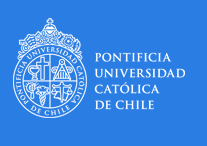

 Regina Funk
Regina Funk Verónica Monreal
Verónica Monreal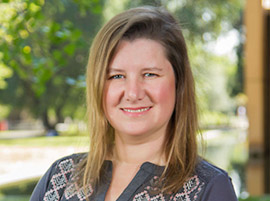 María Paz Tagle Coeymans
María Paz Tagle Coeymans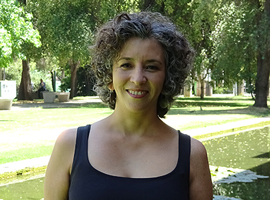 Ana María Solis
Ana María Solis Ximena Muñoz Hagel
Ximena Muñoz Hagel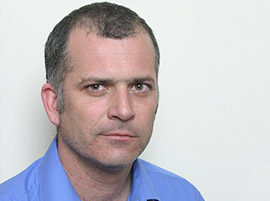 Juan Cristóbal Cox
Juan Cristóbal Cox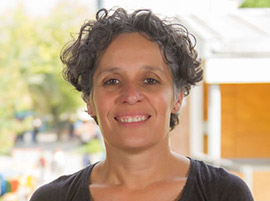 Claudia Araya
Claudia Araya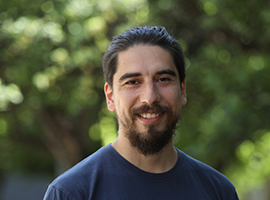 Mario Villena
Mario Villena